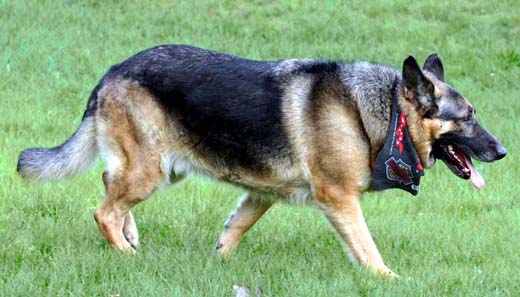It is likely that more than once, you have questioned how to feed your German Shepherd. This fact is common in the owners of this breed that require great care in their diet. In this case, you must keep a preventive control on the weight through certain average categories.
If you have a German shepherd, you must keep an eye on his weight and eating habits. By taking these premises, you will be able to prolong your pet life’s average years. A healthy lifestyle through the necessary care and attention is the key to maintaining your health.
The Ideal Weight Of Your German Shepherd
The best option to determine this aspect is to consult with a veterinarian to obtain accurate information. The average weight can vary depending on the aspects related to sex and height. To guarantee their Ideal weight, you need to make sure that you provide them with a diet or diet established by a professional.
A German shepherd’s average weight is 66-68 pounds males and 48-70 pounds females. It is your veterinarian who can tell you if your dog is at the ideal weight or height.
Male German Shepherd Weight
- 1 month / 9 lbs
- 3 months / 30 pounds
- 4 months / 40 pounds
- 6 months / 57 lbs
- 8 months / 66 pounds
- 9 months / 71 pounds
- 10 months / 73 pounds
- 11 months / 75 pounds
Female German Shepherd Weight
- 1 month / 8 lbs
- 3 months / 26 pounds
- 4 months / 35 pounds
- 6 months / 44-49 pounds
- 8 months / 57 pounds
- 9 months / 60 pounds
- 10 months / 62 lbs
- 11 months / 64 lbs
- 1 year / 64 lbs
- 1 1/2 years / 66 pounds
- 2 years / 66 pounds
- 3 years / 70 pounds
Categories of German Shepherd Body Mass

To keep adequate weight control, you must keep in mind the following categories or averages that indicate your state of health:
- Low weight (underweight)
This category can help you identify a state of malnutrition that various diseases can cause. In adult males, a weight below 55 kg represents a health problem with moderate development. Severe cases present with body mass indexes starting at 25 kilos.
When it comes to adult females, moderate conditions can develop from 18 kg. The harmful problems begin with an average that is between 10 kg to 15 kg.
- Ideal Weight
In males, a healthy weight is between 55 and 60 kg and can vary depending on age and height factors. The approximate average is 60 kg to 55 kg in females, with occasional differences between two kilos. These standards usually represent a good state of health between both sexes.
- Overweight
Being overweight is usually represented from five kilos more than the average or Ideal weight category. This type of excess in the mass can lead to a shorter standard of living and the development of respiratory diseases or conditions. In these cases, you must take the necessary preventive measures starting from the veterinary control.
Related: How to Socialize Your German Shepherd
Causes to Make Your German Shepherd Overweight

If you want to take the appropriate measures to become aware of your pet’s weight, you must bear in mind the following considerations:
- Examine your dog’s behavior
You can likely provide a diet created through a dependent bond. It could also be that your dog has problems related to anxiety, and it shows them in his excess appetite. Symptoms related to depression are not unrelated to these types of eating or weight problems.
- Improper diet
Remember that these types of dogs require specific care, including a personalized eating plan. Giving him foods that contain gluten or sugar could cause obesity and intestinal problems. You must bear in mind that their digestive system does not work in the same way as human beings.
- Lack of exercise
German Shepherds are a breed that requires running at least 3 hours a day. Their energetic state characterizes them. This fact allows them to burn the required calories and constantly renew their energy cycle. By breaking the exercise cycle along with a poor diet, you could cause serious obesity problems.
- Eating human food
This serious mistake is one of the main causes of obesity in dogs and increasingly common in pet owners. Remember that German Shepherds are a breed that requires specific care, and their diet is the key factor. This habit could cause weight problems and intestinal problems.
- Sterilization / neutralization (Spaying / Neutering)
This is usually one of the less common causes of obesity in German Shepherds. In these cases, problems related to the alteration of hormonal cycles can develop. A sedentary lifestyle during the recovery process is also likely to disrupt your pet’s energetic cycle. You must contribute to reinforcing their physical activity to avoid that slight weight gain is a potential problem.
Health Issues Of Being Obesity In Dogs
If you want to become aware of the health or lifestyle of your pet, you should know the following consequences caused by obesity:
- It is likely that aspects related to a sedentary lifestyle can cause mobility problems.
- Being overweight often causes joint problems and even affects concentration levels.
- Diabetes is part of the diseases that obesity causes in dogs, and as a consequence, they can suffer from vision problems.
- High sugar levels pose a serious problem for your pet’s cholesterol and energetic cycle.
- Temporary blindness and disorientation are part of the consequences of diabetes.
- One of the most serious consequences is respiratory problems and collapses in the digestive system.
How To Reduce The Overweight Of The German Shepherd?
The best measure you should consider is to ensure a healthy lifestyle through exercise and proper nutrition. To take these measures, you must make sure you have a veterinarian’s advice. In this way, you can have greater control over your weight and eating habits.
Make sure to provide a specific diet and restrict human food portions. During this rehabilitation process, you must avoid foods with sugar or glucose at all costs. To guarantee the results’ quality, pass your dog daily and try to introduce healthy fiber in his diet.




